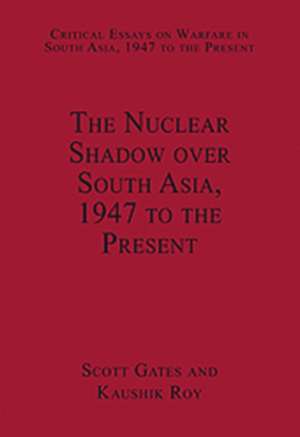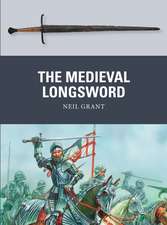The Nuclear Shadow over South Asia, 1947 to the Present: Critical Essays on Warfare in South Asia, 1947 to the Present
Autor Kaushik Roy Editat de Scott Gatesen Limba Engleză Hardback – 20 apr 2011
Preț: 857.93 lei
Preț vechi: 1221.81 lei
-30% Nou
Puncte Express: 1287
Preț estimativ în valută:
164.22€ • 178.44$ • 138.03£
164.22€ • 178.44$ • 138.03£
Carte tipărită la comandă
Livrare economică 21 aprilie-05 mai
Preluare comenzi: 021 569.72.76
Specificații
ISBN-13: 9780754629764
ISBN-10: 0754629767
Pagini: 424
Dimensiuni: 169 x 244 x 96 mm
Greutate: 1.02 kg
Ediția:1
Editura: Taylor & Francis
Colecția Routledge
Seria Critical Essays on Warfare in South Asia, 1947 to the Present
Locul publicării:Oxford, United Kingdom
ISBN-10: 0754629767
Pagini: 424
Dimensiuni: 169 x 244 x 96 mm
Greutate: 1.02 kg
Ediția:1
Editura: Taylor & Francis
Colecția Routledge
Seria Critical Essays on Warfare in South Asia, 1947 to the Present
Locul publicării:Oxford, United Kingdom
Cuprins
Contents: Introduction; Part I Realpolitik and Nuclearization of South Asia: Preventing the 'Smiling Buddha': British-Indian nuclear relations and the Commonwealth Nuclear Force 1964-68, Susanna Schrafstetter; Debating New Delhi's nuclear decision, Rodney W. Jones and Sumit Ganguly; Nuclear deterrence in South Asia: the 1990 Indo-Pakistani Crisis, Devin T. Hagerty; India's nuclear doctrine and command structure: implications for India and the world, Harsh V. Pant; Regime design matters: the CTBT and India's nuclear dilemma, Jyotika Saksena; Toward a 'force-in-being': the logic, structure, and utility of India's emerging nuclear posture, Ashley J. Tellis; India as a nuclear power, Stephen P. Cohen; Limited cooperation between limited allies: India's strategic programs and India-US strategic trade, Varun Sahni; Lest we forget: the futility and irrelevance of nuclear weapons for India, S.R. Valluri; Nuclear and missile development, Pervaiz Iqbal Cheema; Pakistan's nuclear weapons program: turning points and nuclear choices, Samina Ahmed; Weapons of mass destruction: Pakistan's perspective, Jamshed Ayaz Khan; Emerging NMD technologies and India: impact and options for Pakistan, Maria Sultan; The Indian Ocean and the 2nd Nuclear Age, Donald L. Berlin. Part II Strategic Culture and Nuclear Weapons: Hinduism and the ethics of weapons of mass destruction, Katherine K. Young; Of oral traditions and ethnocentric judgements, Waheguru Pal Singh Sidhu; Name index.
Notă biografică
Scott Gates is Research Professor and Director of the Centre for the Study of Civil War, Peace Research Institute Oslo (PRIO), and Professor at the Norwegian University of Science and Technology (NTNU); Kaushik Roy is Reader in History at Jadavpur University, India and Senior Researcher at the Centre for the Study of Civil War, Peace Research Institute Oslo (PRIO), Norway
Descriere
This collection brings together leading research papers which address a wide range of issues relating to nuclear warfare in South Asia. These include articles on: the reasons for the spiralling nuclear race in the Asian subcontinent; the acquisition of nuclear weapons in terms of increased or decreased stability; the dangers of accidental nuclear conflagration; influences on the evolution of nuclear programmes; and mediating nuclear tension between India and Pakistan.










